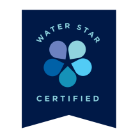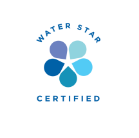University of California, Irvine
In January 2018, University of California, Irvine Campus, earned IRWD’s WaterStar Certification. UCI achieved this recognition by implementing a wide array of water reduction projects, resulting in over 148 million gallons saved annually. Exemplary water savings demonstrated by UCI include:
- 70 million gallons saved annually by converting the campus cooling towers to recycled water
- 45 million gallons saved annually due to plumbing retrofits (with high-efficiency toilets, shower heads, and faucets) in student housing
- 25 million gallons saved annually due to restroom fixture upgrades in academic buildings
- 5 million gallons saved annually due to replacement of once-through cooling systems
- 3.5 million gallons saved annually due to turf replacement and irrigation upgrades
Irvine Campus areas irrigated with potable water are prioritized to receive turf conversions and landscape irrigation upgrades. To date, over 159,000 square feet of turf has been removed across campus and replaced with water-wise and drought tolerant plants.
More UCI water efficiency in the works
In 2015, Student Housing replaced separate irrigation control systems with a central control weather based system in five of its communities. This transition has resulted in better control of water application based on microclimates and improved monitoring. The main campus grounds, maintained by Facilities Management (FM), has historically used a weather based irrigation control system. FM is currently determining the feasibility of replacing this system with a cloud-based central management system, to reduce total irrigation water by an additional 16 to 50 percent.
The UC Sustainable Practices Policy requires campuses to identify single pass cooling systems, constant flow sterilizers, and autoclaves with a plan for replacement. UCI Environmental Health & Safety (EH & S) has been implementing a replacement program for single pass cooling systems and has replaced 36 systems with waterless condensers. Facilities Management is currently piloting the use of water-efficient autoclaves in a Medical Sciences complex.
‹ Back Home






